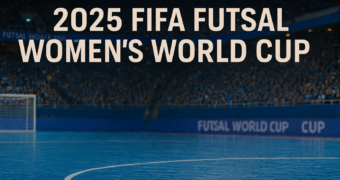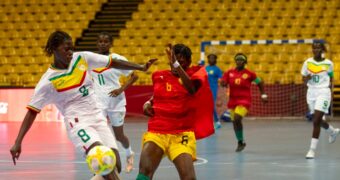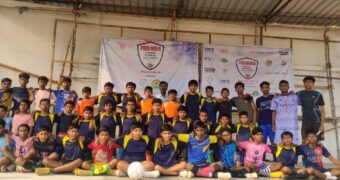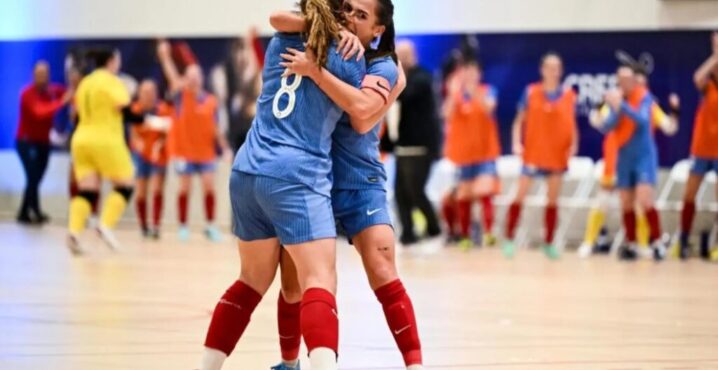Estimated reading time:6 minutes, 51 seconds
Spanish Clubs and RFEF Explore Potential Adjustments in Futsal Rules
Neus Pachón Bermúdez, a respected sports journalist and the Communications Director of EÓN Balonmano Alicante in Spain, recently highlighted via Twitter (X – this is also the source of the main picture) crucial discussions among the Royal Spanish Football Federation (RFEF) and top-tier futsal clubs about potential adjustments to the sport’s rules. These discussions, involving first and second-division clubs, suggest significant modifications that could reshape the game, pending FIFA’s approval.
La @FutSalRFEF y los clubes de 1ª y 2ª han abordado los posibles cambios en las reglas de juego (tiene que aprobar FIFA)
🧤el portero, en saque de meta, no puede atravesar el centro del campo antes de botar o toque a cualquier jugador situado en su propia mitad
(sigue) pic.twitter.com/2sJW1oYAKf
— Neus Pachón Bermúdez (@neus9) July 9, 2024
Key Proposals on the Table
- Goalkeeper Restrictions on Goal Kicks: One proposed adjustment stipulates that goalkeepers, during a goal kick, would be prohibited from crossing the halfway line before the ball bounces or touches a player positioned in their own half. This modification aims to limit the offensive advantage provided by long throws and ensure a more tactical build-up play from the back.
- Accumulated Fouls from Bench Protests: Another notable change concerns disciplinary actions against team benches. Any yellow cards issued to the bench for protests would count as accumulated fouls. This rule could increase the strategic importance of discipline and behavior on the sidelines, potentially influencing how coaches and staff conduct themselves during high-stakes matches.
- Optional Hand or Foot Throw-Ins: A third proposed adjustment involves a new approach to throw-ins. Players may be given the choice to execute throw-ins using either their hands or feet. This experimental rule will be tested throughout the season, with comprehensive statistics collected and submitted to FIFA for evaluation. The objective is to understand how this flexibility impacts the flow and tactics of the game.
Economic Control Measures
In addition to discussing rule changes, the meeting resulted in the establishment of a new working group dedicated to economic control within the league. Elected by the clubs themselves, this group comprises representatives from ElPozo Murcia, Manzanares, Córdoba, and Leganés. The formation of this committee underscores the league’s commitment to financial stability and transparency, reflecting broader trends in professional sports governance. The engagement of clubs in economic oversight also highlights a proactive approach to governance, aiming to secure the league’s future both on and off the pitch.
Historical Context and Implications
Futsal has a rich history of evolving rules that have shaped its unique identity within the broader landscape of football. Historically, the Liga Nacional de Fútbol Sala (LNFS) has been a testing ground for changes that often later receive global recognition by FIFA. Past modifications, such as the introduction of the flying goalkeeper or changes in the duration of halves, have profoundly impacted how the game is played and enjoyed by fans worldwide.
These proposed adjustments follow in that tradition of continuous evolution. However, they also raise several questions:
- How will the new goal kick rule affect team strategies, particularly those relying heavily on goalkeeper distribution?
- What impact will accumulated fouls for bench protests have on the conduct of team officials and the overall disciplinary climate of matches?
- Could the option to choose between hand or foot throw-ins lead to new tactical innovations, or might it disrupt the game’s rhythm?
Looking Ahead
As these proposals move towards potential implementation, the futsal community will be watching closely. The balance between maintaining the sport’s core excitement and introducing changes to enhance fairness and tactical depth will be crucial. We contacted sources within the industry to hear their thoughts on these proposals:
Marcos Antunes, Head Coach of the Angola Futsal National Team, weighed in on the potential changes: “I believe that any changes aimed at improving the game are beneficial. However, we must ensure that we do not become disconnected from the original essence of futsal.”
Martin Perciavalle, a UEFA-qualified coach based in Ireland, offered a different perspective: “I only agree with point 2 regarding accumulated fouls for bench protests. The other two changes I do not support. The restriction on goal kicks could disadvantage weaker teams who use long balls to bypass strong defensive lines. While I understand that Spain’s professional players can press throughout the match, weaker teams need strategies to compete effectively, including long ball tactics. Instead of changing the rule, teams should develop skills to defend against long balls. As for throw-ins, they should remain kick-ins. Using hands is for goalkeepers or handball, not futsal.”
Fellipe Drommond, President of Magnus Futsal Club from Brazil and the current holder of the Copa Libertadores de Futsal, shared his thoughts: “I think futsal needs to be more appealing to young audiences. Changing the rules is one way to improve the game. However, I don’t like the idea of ball repositioning with hands; the beauty of futsal lies in the ball sliding across the court. I support the proposed technical foul and goalkeeper changes. Additionally, I would like to see more changes, such as penalizing any defensive hand contact to stop an attack, limiting the time the goalkeeper can play with their feet, and eliminating draws by ensuring every game has a winner. A 1v1 challenge in extra time would make the game more attractive, dynamic, and engaging, resulting in more goals and increased public interest.”
Constantine Konstin, Head Coach of the Haiti National Futsal Team, expressed concerns about the goalkeeper restrictions: “I believe this change would disrupt the game and impact its entertainment value. However, I fully support the accumulation of fouls from bench protests, as more should be done to ensure discipline within the game. As for throw-ins, I am indifferent between foot or hand. I’ve seen statistics suggesting there were more goals when throw-ins were previously allowed in futsal.”
Vic Hermans, Futsal Technical Consultant for the Philippine Football Federation and the Head Coach of the Women’s National Futsal team, commented on the proposals: “For me, these are not the most important rules. Spain was the first to bring in the goalkeeper role as it is now, so why change it? I don’t find any of these changes particularly relevant. During the European Football Championship, we saw referees issue many yellow cards to players on the bench, but what is the purpose? Many years ago, I sent a video to FIFA highlighting numerous fouls with the question, ‘How can we protect this technical game?’ A more relevant rule change would address the disparity in punishment between futsal and football, where a player who tackles someone going alone toward goal receives a yellow card in futsal but a red card in football.”
In Summary
These discussions and proposed changes reflect the dynamic nature of futsal and its ongoing evolution. With input from key stakeholders and a focus on enhancing the game, the potential adjustments could mark a new chapter in the sport’s development. Neus Pachón Bermúdez’s insights provide a valuable lens into these transformative discussions, signalling a period of thoughtful experimentation and strategic planning for the future of futsal. The diverse opinions from the futsal community highlight the importance of considering various perspectives to maintain the sport’s integrity while fostering its growth.
Organ Donation
Futsal Focus is a supporter of Dáithí Mac Gabhann and his family’s campaign to raise awareness of Organ Donation. We encourage our readers to learn more about Organ Donation: https://www.organdonation.nhs.uk/
Futsal Focus
You can read more articles about domestic futsal by going to the top navigation bar or by clicking here
If you like this article and would like to keep updated on Futsal news, developments, etc then you can now follow Futsal Focus via Google News by following our page which will send you an alert as soon as we publish an article so please click here and follow us on Google.
You can also keep updated on Futsal news, developments, etc then please submit your email below in the Subscribe to Futsal Focus option.
Follow Futsal Focus by clicking on Facebook, Twitter, or Instagram or on the social media buttons on the website
















![Validate my RSS feed [Valid RSS]](https://www.futsalfocus.net/wp-content/uploads/2020/01/valid-rss-rogers.png)




